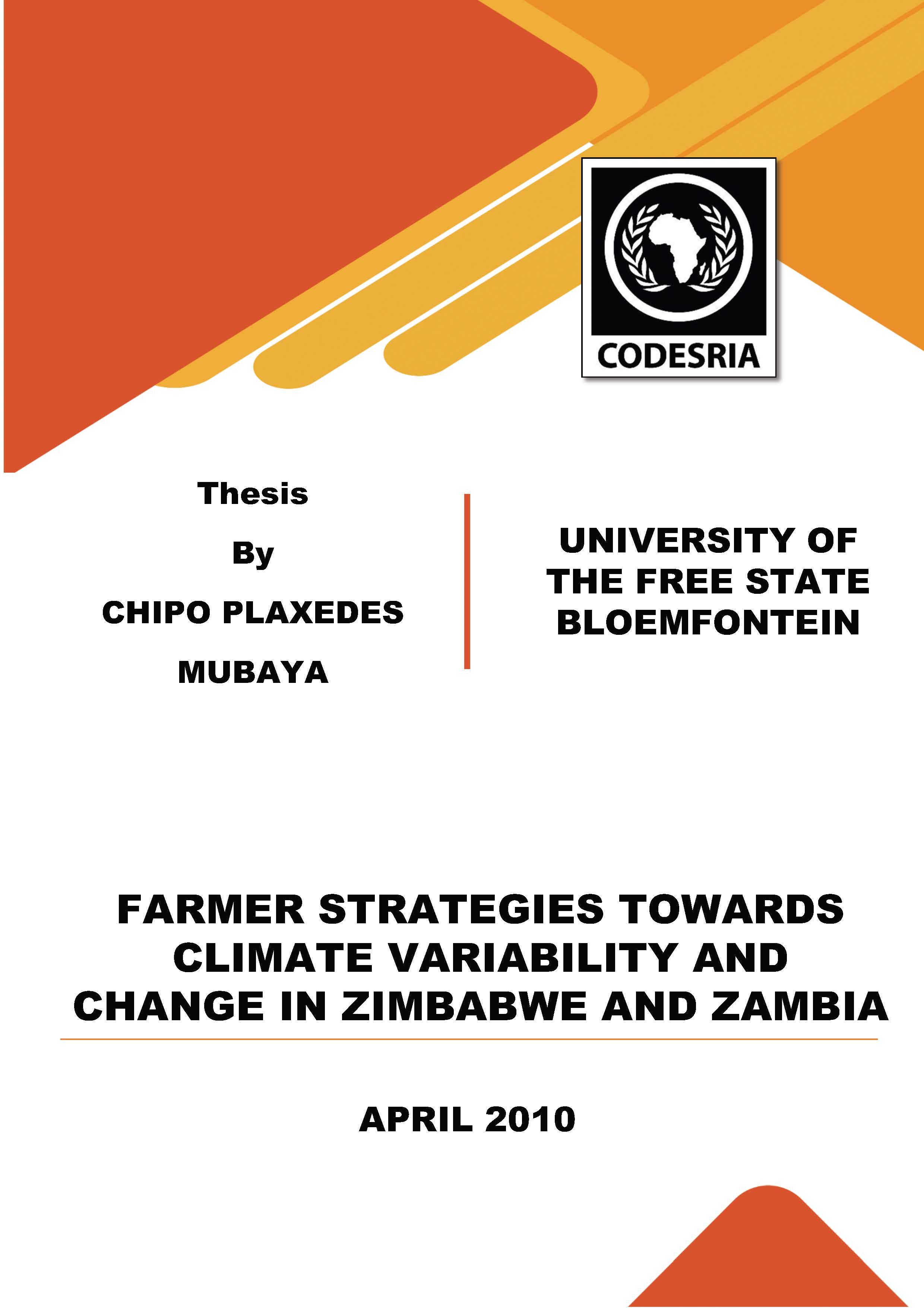FARMER STRATEGIES TOWARDS CLIMATE VARIABILITY AND CHANGE IN ZIMBABWE AND ZAMBIA
Keywords:
Climate change, Climate variability, Farmers, Perceptions, Vulnerability, Impact, coping, Adaptation, Zimbabwe, ZambiaSynopsis
There is wide scientific consensus that concentrations of greenhouse gases in the atmosphere are increasing due to human activities, causing global climate change. Climate change exerts significant pressure on the agricultural sector and economic development of Africa. Despite a growing number of country-level case studies, knowledge gaps· continue to exist at the level of impact analysis. In addition, while adaptation and coping with climate variability and change have become key themes in current global climate discussions and policy initiatives, literature on adaptation in Zimbabwe and Zambia appears to be still limited.
In this regard, this study addressed the following objectives:
• To investigate farmer perceptions of threats from climate variability and change and how these may differ across countries;
• To identify and analyse the impacts of climatic variability and change on farmer households in the two countries; and,
• To identify coping and adaptation strategies to climate variability and change employed by farmers and investigate factors influencing choice of adaptation/ coping strategies across the study districts.
Methods used to collect data for this study are both qualitative and quantitative methods. The specific method used in the Quantitative approach is the survey. Qualitative methods used include Participatory Rural Appraisal (PRA), specifically, resource mapping, historical trend lines, seasonal and daily activity calendars and matrix scoring and ranking. FGDs and indepth case studies were also used.
Conclusions drawn from the findings of the study are listed below:
• While farmers report changes in local climatic conditions consistent with climate change, there is a problem in assigning contribution of climate change and other factors to observed negative impacts on the agricultural and socio-economic system
• While there are multiple stressors that confront farmers, climate variability and change remain the most critical and exacerbate livelihood insecurity for those farmers with higher levels of vulnerability to these stressors
• There are variations in manifestations of direct and structural impacts from climate variability and change as a result of differences in types of farming systems and general economic and political contexts
• Apart from its overwhelmingly negative effects, climate variability might also have a positive impact and localised benefits in the context of structural changes in communities-social organization and economic activities-under certain circumstances.
• Significant responses to climate variability and change involve organizing agriculture and related practices, than switching to off farm initiatives
• While farmers' selection of coping and adaptation strategies to climate variability and change and the associated outcomes may be intrinsic, this selection tends to be overwhelmingly shaped by diverse factors such as demography, access to information and assets and vulnerability levels Following the above conclusions, the study recommended that there is need to:
• Strengthen the capacity of farmers and institutions for identifying and assessing climate changes through programmes to educate farmers and other relevant stakeholders on climate change and variability and their potential impacts on farmers' livelihoods
• Make a transition from designing policies that target climate change issues as a distinct entity to policies that address climate change issues as an integral component of multiple stressors that confront farmers
• Design appropriate policies that buttress farming systems against climate variability and change through taking into account variations in these farming systems and other relevant factors
• Make a transition from conceptualisation of climate change impacts in the policy framework as being inherently negative, to research and policy making with an openminded lens that dissects climate change and variability impacts in order to enhance alternative livelihoods for farmers
• Provide support for appropriate agricultural innovations and development of new livelihood activities emerging as farmers respond to climate variability and change
• Integrate sectors through interventions that target agricultural extension, meteorology, academic research and other developmental activities through civil society organisations
Downloads
References
ACT International 2003. Drought Relief-AFZW-21 Appeal (Revision 3) Geneva. Switzerland
ACT International 2004. Drought Relief-AFZW-21 Appeal (Revision 3) Geneva. Switzerland
Adams, R. M., Rosenzweig, C., Peart, R. M., Richie, J. T., MacCarl, B. A., Glyer, J. D., Curry, R. B., Jones, J. W., Boote K. J. and Allen, L. H. Jr., 1990. Global Climate Change and US Agriculture. Nature, vol. 345, pp. 20-31.
Adams, A., Cekan, J., and Sauerborn, R., 1998. Towards a conceptual framework of adaptation measures and perceptions of climate change in the Nile Basin of Ethiopia.
International Food International Food Policy Research Institute (IFPRI) Discussion Paper No.00500. Washington, DC: IFPRI.
Adesina, A. A., 1996. Factors affecting the adoption of fertilisers by rice farmers in Cote D'lvore Nutrient Cycling in Agro-Ecosystems vol. 46 pp. 29-36.
Adger, W. N., 1999. Social vulnerability to climate change and extremes in coastal Vietnam World Development, vol. 27 pp. 249-269.
Adger, W. N., Huq, S., Brown, K., Conway, D. and Hulme, M. 2003. Adaptation to climate changes in the developing world. Progress in Development Studies, vol. 3, pp. 179-195.
Adger, W. N., Agrawala, S., Mirza, M., Conde, C., O'Brien, K., Pulhin, J., Pulwarty, R., Smit, R. and Takahashi, K., 2007. 'Assessment of adaptation practices, options, constraints and capacity.' In: Parry, M., Canziani, 0., Palutikof, J., and Van der Linden, P. J., (eds.) 2008.
Climate Change 2007: Impacts, Adaptation and Vulnerability. Contribution of Working Group II to the Fourth Assessment Report of the Intergovernmental Panel on Climate Change
Admassie, Y., 1995. Twenty Years to Nowhere: Property Rights, Land Management and Conservation in Ethiopia. Uppsala. Department of Sociology, Uppsala University.
Agarwal, B., 1991. 'Engendering the Environment Debate: Lessons from the Indian Subcontinent,' Centre for Advanced Study of International Development (CASIO) Distinguished Lecture Series, Discussion Paper 8, Michigan State University, Michigan.
Agoumi, A., 2003. Vulnerability of North African countries to climatic changes: adaptation and implementation strategies for climatic change. IISD/Climate Change Knowledge Network. Accessed 12 February 2009, http://www.cckn.net//pdf/north africa.pdf.
Aguilar, L., 2004. Climate Change and Disaster Mitigation, (IUCN). Accessed 18 February 2009, http://www.iucn.org/congress/women/Climate.pdf.






